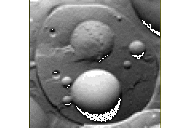ehemalige Abteilung für Biochemie Intrazellulärer Transportprozesse
We are interested in the regulation of intracellular trafficking events and have a special focus on the functional role of covalent modifications of proteins and lipids.
The dynamically regulated subcellular localization of key factors involved in different biochemical pathways represents an integral building block of cellular physiology. Therefore, defects in these targeting pathways often affect cellular functions and can lead to diseases in humans.
In order to study these principles, we utilize peroxisomes as our main model system. What makes them so interesting for our studies on intracellular transport is that they are very dynamic organelles. Their enzyme content and therefore biochemical function can be modulated according to the cellular demands. Furthermore, the size of the peroxisome population within the cell can be adjusted depending on the varying cellular needs.
Therefore, we are interested in two central transport processes: (1) the biogenetic transport of newly synthesised peroxisomal enzymes from the cytosol over the peroxisomal membrane into the matrix as well as (2) the transport of the entire organelle to the vacuolar lumen in the context of selective autophagic degradation.
The main question in both cases concerns the functional role of the posttranslational modification of proteins with ubiquitin, as well as the impact of signalling lipids like phosphatidylinositol 3-phosphate (PtdIns3P).
The phosphatidylinositol 3-phosphate (PtdIns3P) – generating kinase complex is not restricted to selective autophagy, but is also involved in general autophagy, vesicle trafficking, cytokinesis and endocytosis. Therefore, we also elucidate the requirements that define where and when PtdIns3P is generated and how the outcome of the subsequent signalling cascade is integrated in one of the mentioned cellular events. In this context we are mainly interested in how the PtIns3P-signaling cascades regulate the different autophagic transport pathways as well as endocytic and vesicular trafficking routes to the vacuole/lysosome. This is of special relevance because the PtdIns3P-based signalling has been found to play a role in tumor suppression.
Our research group utilizes state of the art methods in biochemistry, cell biology and molecular biology. This enables us to track individual transport events by the use of selective markers and inhibitors by applying fluorescence microscopy as well as biochemical subcellular fractionation. We can isolate soluble as well as membrane bound protein complexes and study their assembly, and can also purify heterologously expressed proteins from bacteria in order to study protein-protein interactions or ubiquitination reactions in vitro. Furthermore, we work in close cooperation with specialists for mass spectrometry and electron microscopy.
Further overview on the topic:
-
Regulation of the Tumor-Suppressor Function of the Class III Phosphatidylinositol 3-Kinase Complex by Ubiquitin and SUMO.
Reidick, C., El Magraoui, F., Meyer, H.E., Stenmark, H. & Platta, H.W.
Cancers (Basel) 7, 1-29 (2015) -
The cycling peroxisomal targeting signal type 1 - receptor Pex5p: reaching the circle`s end with ubiquitin.
Platta, H.W.
Receptor. Clin. Invest. 1, 55-68 (2014) -
The peroxisomal receptor dislocation pathway: to the exportomer and beyond.
Platta, H.W., Hagen, S., Reidick, C. & Erdmann, R.
Biochimie 98C, 16-28 (2014) -
Molecular basis of peroxisomal biogenesis disorders caused by defects in peroxisomal matrix protein import.
Nagotu, S., Kalel, V.C., Erdmann, R. & Platta, H.W.
Biochim. Biophys. Acta – Mol. Basis Dis. 1822, 1326-1336 (2012)


